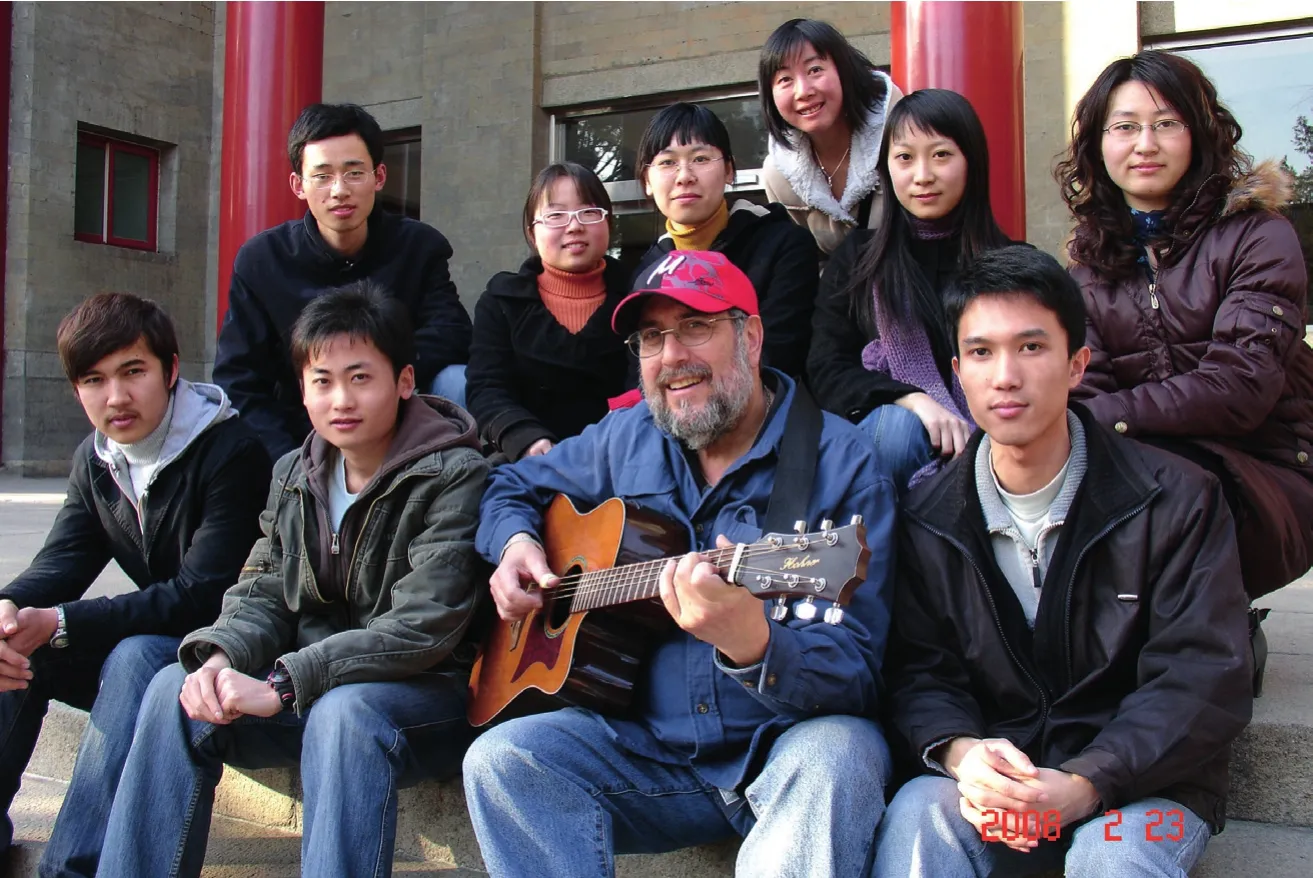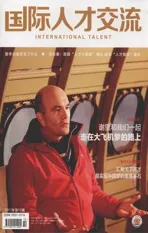我这个美国人的中国梦
2017-12-15马克力文
文/马克·力文
我这个美国人的中国梦
文/马克·力文
I have a Chinese Dream
2013年3月14日,我在北京国家大剧院的歌剧厅表演。大厅里人山人海,观众们都是来参加纪念中华人民共和国第一任总理周恩来诞辰115周年音乐会的。我表演的时候,身后的整个管弦乐团,安静地等候着为其他的表演者伴奏。我演唱时只需要我自带的吉他伴奏,管弦乐队背后有一面装饰墙,墙上是周总理的照片,上面还写着音乐会的主题是纪念周总理诞辰,更醒目的是三个红色的大字:中国梦。
倾听中国梦
“我梦想着有一天,当建筑工人们疲惫不堪的时候能有一张床休息,清洁工人们能有一张干净的桌子吃饭;我梦想着有一天,那些为了提高我们每一个人的生活条件而无私奉献的好人们,和那些为城市作出巨大贡献的人们能够获得我们的理解和尊敬。”
这是孙晓阳(Maggie)演讲中的一段话。她是中央民族大学社会学专业的一名大四学生。就在她毕业的前几个月,她参加了学校举办的英语演讲比赛,并进入了决赛,所有参赛选手的演讲主题都是“我的中国梦”。
“……我的中国梦是,有一天人们不再因为贫穷而辍学;城市和乡村的学生们能够拥有同样先进的教学设备,每一个学生都能够享有平等的教育。”这是我们到中国的海滨城市山东青岛,坐在青岛大学的大礼堂里,听一位名叫门亚萍(Men Yaping)的学生作她的“中国梦”演讲,讲述中国需要被关注的素质教育。
2013年7月11日,我与其他14名外国专家参加了“纪念邓小平《利用外国智力和扩大对外开放》重要谈话发表30周年座谈会”。这位中国前任领导人在1983年的谈话中曾谈道:“要利用外国智力,请一些外国人来参加我们的重点建设以及各方面的建设。对这个问题,我们认识不足,决心不大。搞现代化建设,我们既缺少经验,又缺少知识。不要怕请外国人多花了几个钱。他们长期来也好,短期来也好,专门为一个题目来也好。请来之后应该很好地发挥他们的作用。过去我们是宴会多,客气多,向人家请教少,让他们帮助工作少,他们是愿意帮助我们工作的。”
所有参加座谈会的发言人,无论中国的还是外国的都谈到了邓小平是如何重视外国人对中国的作用的。其中一位发言人指出,20世纪80年代,在中国的外国专家还不到1万人,而到2012年的时候几乎达到了60万人。许多与会发言人都谈到了中国在吸引外国专家方面所做的努力,以及可以继续提升和改进的地方,以便吸引更多、更好的外国专家。他们还谈到了在过去的三十年里,外国专家为中国作出的贡献以及他们未来的贡献。每一个发言人也都无一例外地将自己的论述和“中国梦”相结合。
在座谈会的前一天,中央民族大学国际关系办公室的凯文(Kevin)给我打来电话说国家外国专家局找两个英语为母语的外籍老师担任外专局举办的内部英语演讲比赛的评委,题目是“OEI,我的中国梦”。
随后一周的某天我便去了外专局,同时了解到原来OEI就是三十年前邓小平提出的“外国专家引进”(Overseas Expertise Introduction)的英文首字母缩写。外专局的18名参赛员工中有我之前在参加外专局的一些其他活动中见过的。在他们的演讲中,我感到了他们的梦想:“……成为中外文化交流的使者,让更多的外国人了解中国,了解中国灿烂的文化和五千年悠久的光辉历史。”
一位演讲者说道:“包括外国专家在内的国际友人,在中国和外国的联系中起到了桥梁和纽带的作用。”最后,她以这样一段话结束演讲:“中国梦不是一个宏大的口号,它不只源属于政府,更属于每一位普通人。”
中国梦到底是什么?
在2012年11月底习近平总书记发表的一次讲话中,“中国梦”第一次受到全国的关注。习近平总书记在参观国家博物馆《复兴之路》展览时说道,中华民族近代以来最大的梦想,就是“实现中华民族的伟大复兴”。
就在习近平总书记发表讲话半年之后,《中国日报》(China Daily)报道称“中国梦”现在是媒体和教材中被提及最多的词汇之一。哈佛商学院的副教授马奎斯和助理研究员杨佐伊也分别指出,“中国梦”在中国迅速受到认可和传播,这在近代历史上史无前例。这种传播不仅只局限于演讲比赛,在其他各类研讨会中也是随处可见。
但是根据我们从各类演讲中看到的来讲,人们之间关于中国梦是什么或者应该是什么的看法有很大不同。
从广义上来讲,中国梦还有这样的一个问题,它到底是每个中国人的梦,还是整个国家的梦,它意味着“我的家庭不再贫困”,还是“每个人都脱离了贫困”?它是否意味着“我的梦想能够实现”,还是“每个人的梦想都能实现”,还是“中国社会整体上取得了一定的进步,从而保障了人民的安全”?
有些学生关注的是自己个人的梦想,比如希望看到国足获得国际认可,在某个具体的事业中有所建树,或者能去某些地方旅行。但更多的学生关注于改善环境,提倡全民自由和素质教育,为农民工和农民工家庭争取权利,或者帮助那些父母在大城市打工,只能跟乡下的爷爷奶奶生活的留守儿童。而在外专局职员们的眼中,他们的中国梦又有所不同,他们的梦关乎如何让外国人更好地为中国建设提供帮助。
尽管自习近平总书记在2012年发表演讲后,关于中国梦的讨论如火如荼,这个说法却早已有之,而且也不仅限于中国人。《人民日报》2011年的一篇文章中曾提到过关于三个美国人和一个英国人的特别的中国梦:一个想成为一名电视主持人,一个想成立一个非政府组织,一个想开一家西餐厅。还有一个,我的朋友柳素英(Elyse Ribbons),既想做个剧作家或者戏剧制作人,又想成为一名电台主持人或者做一名女演员。
柳素英来自底特律,曾经梦想着凭借大学时学习的阿拉伯语为美国国务院工作,但这个梦想在2001年的北京之旅后发生了改变。她首先转学汉语专业,然后在中国学习了一学期,2003年大学毕业后便搬到了北京。
她在中国最初的梦想是学习中医并将其带回美国,但很快又发现自己的能力和兴趣均不在此。尝试了多种工作以后,她在2006年有了一个新梦想——成为一名剧作家。从那时起到现在她已经写了不下6部作品。
柳素英说,她的朋友们觉得她是在中国追寻和实现自己的美国梦。“这听着有点儿滑稽,但也说得过去,”她说,“‘中国梦’是对年轻的专业人才来说的,他们追求一种独特的早期职业经验,同时愿意努力工作,推动自身进步。”
我基本上同意她的观点,但从个人经验来讲,我认为中国梦并不仅限于年轻人。我每天都能见到有越来越多不同年龄的外国人,他们起初来中国只是想待个一两年,但十年甚至更长时间过去了,他们仍然还在中国。他们有些人依然在教课或者做着和刚来中国时相同的工作,但对于在中国受到的热情欢迎仍都心存感激。当他们在追寻自己的中国梦的时候,有很多大门都会为他们敞开,他们对此感觉有些吃惊,可这又会让他们充满热忱。
中国梦应该从国家和个人两个层面来理解
从国家层面看来,“一带一路”可以说是中国梦的一座里程碑。“一带一路”旨在复兴历史上伟大的丝绸之路,消除沿线国家基础建设上的差距以带动经济发展,并进一步促进中国与世界的互联互通。通过亚洲基础设施投资银行的资金援建铁路、发展海上贸易,中国在发展中国家,甚至很多发达国家的经济影响力持续增强。
除了经济上的影响力,中国也正在成为应对气候变化的主要力量。很多国际能源机构认为,中国在《巴黎气候变化协定》中的国家自主贡献率为对抗全球变暖作出了巨大的贡献。次外,中国在风能、太阳能等环保技术发展中的领先地位也是中国通向“复兴之路”的又一体现。
说回我自己的“中国梦”,是帮助外国人深入了解中国,同时帮助中国人更加了解美国。我不仅写作,我还和音乐搭档傅涵组成了一个跨文化的组合,名为In Side Out,我们的表演将中文、英文,以及西方的吉他和中国的二胡结合在一起来表演中英文歌曲。In Side Out的首秀在美丽的湖南张家界举行的“国际乡村音乐节”上,在来自20多个国家的数百名音乐家面前,我们让外国观众看到了中国的美丽、友好,体会到了中国音乐的魅力。
之后,我的“中国梦”舞台变得更大了。2014年春天,我获得了北京市人民政府颁发的“长城友谊奖”,2015年,我又获得了中国政府友谊奖的殊荣。2016年,我成为了第一个因中国政府友谊奖而拿到中国永居资格的外国专家。
所有这一切让我在实现“中国梦”的路上越走越远,也让我能够更好地向世界介绍这个友好、勤劳,有着非凡文化魅力的国度——中国。(傅涵供稿)
I am on stage at the Opera House of the National Center for the Performing Arts in Beijing. It is March 14, 2013, and the hall is filled to capacity. The audience is here to celebrate the 115th birthday of Zhou Enlai, the first premier of the People’s Republic of China. Behind me as I sing is a full orchestra. They are there to accompany the other performers on the program and are now sitting quietly, as my guitar provides all the accompaniment I need. Behind the orchestra, the set includes a decorated wall with a picture of Premier Zhou, which introduces the event as Zhou’s birthday and includes three large red Chinese characters that translate as “Chinese Dream.”
Listening to Chinese Dream
“I have a dream that one day construction workers can have a bed to sleep [in] when they are exhausted and the street cleaners can have a nice clean table to have their lunch. I have a dream that one day those good people who dedicate themselves to improving the living situation for everyone and make such great contribution[s] to the city, can live with understanding and respect from everyone.”
This is an excerpt from a speech by Sun Xiaoyang (Maggie),a college senior majoring in sociology at Minzu University of China. Maggie is a contestant in the final round of the university’s English speaking competition a few months before her graduation. The theme of her speech and those of all the other contestants is “My Chinese Dream.”
“… My Chinese dream [is] that one day poverty won’t be the cause of dropping out; that one day rural and urban students will share the same advanced devices; that one day every student get[s] equal education.” We are in a large auditorium at Qingdao University in the coastal city of the same name in China’s Shandong Province. Men Yaping, a student at the university, is presenting her “Chinese Dream” speech, which focuses on the need for quality education.
It is July 11, 2013, and I am one of 15 foreign experts attending a “Symposium on the 30th Anniversary of Deng Xiaoping’s Remarks on Intellectual Resources Introduction.” In his 1983 speech, the former political leader argued: “We should make use of the intellectual resources of other countries by inviting foreigners to participate in key development projects and other construction projects in various fields. We haven’t recognized how important this is, and consequently we haven’t done as much as we should have. In the matter of modernization we have neither experience nor technical knowhow. We should not be reluctant to spend money on recruiting foreigners. It doesn’t matter whether they stay here for a long time or a short time, or just for a single project. Once they are here, we should make the best use of their skills. We have been giving them too many banquets and have been too hesitant about asking for their help and advice, when in fact they have been quite willing to assist us in our work.”

作者与中央民族大学的学生们一起享受音乐
All of the speakers at the symposium, both Chinese and foreign,discuss how Deng expanded the role of foreign contributors.As one speaker notes, in the 1980s there were fewer than 10,000 foreign experts, compared with almost 600,000 by 2012. Many speakers talk about what China has done to attract foreign experts; what it could improve to attract more or better-skilled experts; what foreign experts have contributed to China in the past three decades; and what foreign experts can contribute in the future. Without exception, each speaker links his or her comments to the “Chinese Dream.”
The day before the symposium, Kevin from the Office of International Relations at MUC calls and informs me that he has just been contacted by the State Administration of Foreign Experts Affairs (SAFEA).Kevin is looking for two English teachers who are native speakers to judge an in-house speaking competition for SAFEA employees in one week. The topic “OEI,My Chinese Dream.”
Arriving at the SAFEA competition the next week, I learn that OEI stands for “Overseas Expertise Introduction,” which is exactly what Deng Xiaoping was talking about three decades earlier. I also discover that of the 18 SAFEA employees who are competing, I already know two of them. I learned about their dream of “… becoming a cultural messenger of cultural exchanges between China and foreign countries, to let more foreigners know China, know this country with a splendid culture and long history, with 5,000 years of glory.”
Another speaker also asserted that “foreign experts have played a vital role in the great achievements China has made.” She argues that “foreign friends, including foreign experts working in China, serve as bridges and bonds in China’s ties with the outside world.” Li Yiwen closes her speech by saying the Chinese Dream “isn’t a grandiose slogan. It doesn’t just come from the government. It belongs to every ordinary person.”
What is the Chinese Dream?
The “Chinese Dream” first hit the national consciousness at the end of November 2012 through a speech given by Xi Jinping.Xi was speaking at an exhibit on the “Road Toward Renewal”at the National Museum in Beijing. He argued that the greatest dream for China in modern times was the “rejuvenation of the Chinese nation.”
Only half a year after Xi’s speech, China Daily reported that“Chinese Dream” now ranked as one of the most frequently used phrases in media and even in textbooks. As noted by Chris Marquis and Zoe Yang, associate professor and research associate at Harvard Business School, respectively,the phrase “Chinese Dream” is unparalleled in recent history in its rapid acceptance and spread throughout China. It is not limited to speaking competitions but can be seen in other forums as well.
As we can see, particularly from the various speeches, there is a great diversity of opinions about what the Chinese Dream is, or should be.
At the broadest level, there is the question of whether the Chinese Dream is for individuals or for China as a whole. Does it mean “My family is no longer poor” or that “Poverty has been eliminated for everyone”? Does it mean “My dreams can be realized” or “Everyone’s individual dreams can be realized,” or that “Chinese society as a whole has achieved a certain level of progress to ensure security and safety for all”?
Among students there are some whose speeches focus on their own personal dreams, whether it be to see the Chinese soccer team gain international respect, to pursue a specific career, or to be able to travel to special places. But for each of these there are many more students who focus on improving the environment,promoting freedom and quality education for all, gaining rights for migrant workers and their families, or helping the “leftbehind children,” who stay with their grandparents back in their villages or small cities while their parents work in the big cities. Among the SAFEA employees, the “Chinese Dream” was something different. It had to do with how foreigners could aid in the future building of China.
Although discussion about the Chinese Dream has intensified since Xi’s 2012 speech, the idea is certainly not new, nor is it limited only to Chinese people. For example, a 2011 article in China Daily talks about three Americans and one Briton and their particular Chinese dreams: one a TV host, one the founder of a charitable NGO, one the owner of a Western restaurant and one,my friend Elyse Ribbons, a playwright, theatrical producer, radio host and actress.
Elyse, a native of Detroit, dreamed of working for the U.S. State Department to make use of the Arabic language she studied in college, but that dream was replaced after a 2001 trip to Beijing.First she changed her major to Chinese, and after another semester in China, she moved to Beijing in 2003 following her college graduation.
Her initial dream in China was to study Chinese medicine to take back home to the U.S., but she soon realized that neither her skills nor her interests lay in that field. After a variety of jobs, she found her new dream as a playwright in 2006 and since then has had more than half a dozen productions.
According to Elyse, her friends say she is pursuing and realizing her American Dream by living in China. “That is kind of funny, but it is also kind of true,” she says. She continues, “The‘Chinese Dream’ is for young professionals seeking a unique early-career experience and who are willing to work hard and push themselves.”
While I mostly agree with Elyse, based on my own experience I don’t think that it is limited to the young. Every day I meet more and more foreigners of all ages who originally came to China for one or two years, and are still here a decade or more later. Sometimes they still teach or do whatever they first came to do, but in many cases they simply appreciate the warm welcome they received. They are amazed and enthused by the many doors that stand open for them as they pursue their own Chinese Dream.
Chinese Dream continues to be interpreted from both a national and personal perspective
From a national perspective, the “Belt and Road Initiative” can be considered a hallmark of the Chinese Dream. Centered on the revitalization of the historic Silk Road it is bridging the infrastructural gap to facilitate economic growth and connect China to the rest of Asia, Europe, Oceania and Africa. Aiding in the building of rail lines and the expansion of maritime trade with funding from the Asian Infrastructure Investment Bank (AIIB), China is playing a key role in economic expansion both in developing nations and in some countries generally identified as developed nations. This is truly rejuvenation.
In addition to this lead role in economic development, China is also becoming a major force in dealing with climate change.China’s INDC (intended nationally determined contribution) to the Paris Climate Agreement has been viewed by a number of international energy agencies as a significant contribution to the fight against global warming. Between this and China’s lead role in the production of technology for both wind and solar power, we can see yet another area of rejuvenation.
As we turn to my own Chinese Dream, my objective was to make a contribution to foreigners gaining a clearer understanding of China and helping Chinese people understand more about the U.S.
At about the same time that I was writing that, my musical partner Fu Han and I formed the cross-cultural musical duo called In Side Out with which we combined English and Chinese language, western (guitar) and Chinese instruments(er-hu) and English and Chinese songs. Our premier performance was at an international country music festival in the beautiful scenic area of Zhangjiajie in Hunan Province.With hundreds of musicians from nearly two dozen countries,we helped these foreign visitors learn about the beauty, the friendliness, the music and other features about China.
Other events beginning in 2014 helped to expand that platform even more in an effort to bring the world a little closer together.In the spring I was awarded the Great Wall (Beijing) Friendship Award and, as I mentioned above, later that year I was one of 100 foreign experts who were presented with the Chinese Friendship Award. Then in the spring of 2016, I received a Chinese permanent residency.
All of these have given me more opportunities to materialize my dream of helping to tell the world about this friendly, hardworking, culturally fascinating place called China.
